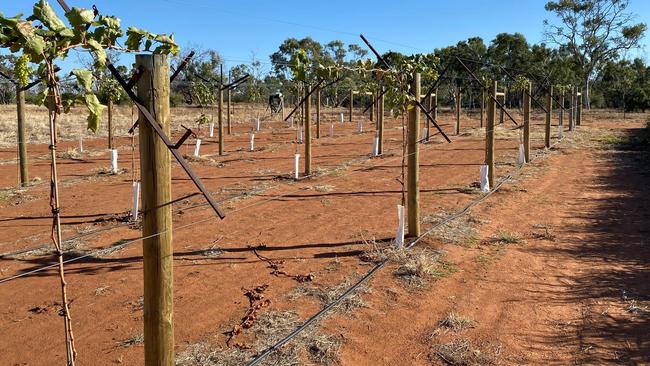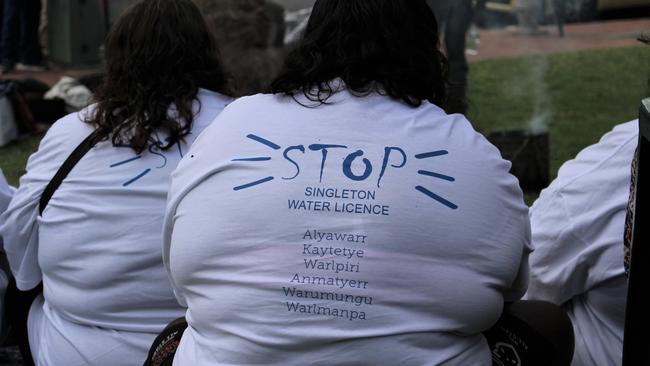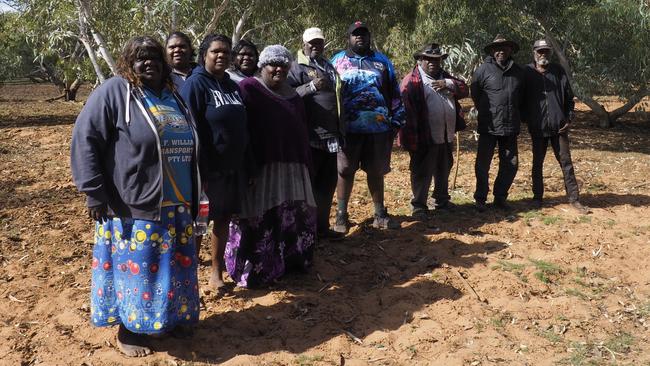Mpwerempwer Aboriginal Corporation loses appeal against Singleton Station water licence
A plan to extract two Sydney Harbours’ worth of water to create a horticultural oasis in the Central Australian desert has defeated a Supreme Court challenge.

News
Don't miss out on the headlines from News. Followed categories will be added to My News.
A plan to pump the equivalent of two Sydney Harbours’ worth of water from the Central Australian desert to create a horticultural oasis has defeated a Supreme Court challenge.
On Monday, Mpwerempwer Aboriginal Corporation lost its Supreme Court appeal of the decision by the NT Government to approve Australia’s largest water extraction licence at Singleton Station.
The property owner, Fortune Agribusiness said the proposed 3500ha Singleton Station project would create a nationally significant food bowl using “intensive irrigated horticultural” methods, 30km from Ali Curung.
In 2021 Fortune was approved for a 40 gigalitre per year groundwater licence for 30 years, extracted from the Central Plains Management Zone in the Western Davenport Water Control District.

It has been estimated that over the life of the licence, twice the volume of the Sydney Harbour would be extracted from the aquifers of the arid lands region for free.
The Justices said a referral to the Water Resources Review Panel in 2021 had flagged a “dearth of material” provided to address concerns about the “key objectives” of the applicable Water Allocation Plan, protection of Aboriginal cultural values associated with water.
Just four days after the Review Panel’s handed in its findings, then-Territory Families Minister Kate Worden as a delegate to the Environment Minister signed off on a revised licence on November 15, 2021.
MAC and the Arid Lands Environment Centre challenged the decision in the Supreme Court, but in January last year Justice Peter Barr rejected their bid.
Fifteen months after this, MAC has been hit with a second high court defeat with Justice Judith Kelly, Meredith Huntingford and John Burns handing down their 115-page decision dismissing their appeal.

MAC alleged the Minister failed to provide justifications and explain the “special circumstances” requiring the licence in excess of 10 years, and should have rejected the application.
However Fortune and the government argued that due to the scale of the proposed project, the level of investment in the project, the time required to develop the project and the potential economic benefits, the 30 year licence had been justified.
The Appeal Justices said MAC’s interpretation of the Act would create “an absurd outcome” where the minister could not refer back to the water controller if they needed further clarity.
“The only possible action that the Minister could take, regardless of the merits of the application, regardless of the cost to the applicant and other interested parties, would be to substitute a decision to refuse the application,” they said.
“It is difficult to contemplate any sound policy objective for such an approach.
“This Court should not lightly attribute such absurdity to the legislature.”
The appeal judges instead ruled that the “only reasonable interpretation” was that the Minister could “stands in the shoes of the Controller” and exercise their powers in justifying the 30 year lease.

“It should be inferred from all of the circumstances surrounding the granting of the Licence that the Minister was satisfied that special circumstances existed justifying a 30-year licence,” the Justices said.
The Appeal also rejected arguments that the licence should have taken into account any water allocation plan applying to the area and the Aboriginal cultural values were not a mandatory relevant consideration.
They said it ultimately fell on the Minister to give “each factor such weight as the Minister thinks fit”.
The decision highlighted that under the conditions of the licence Fortune would have to conduct an assessment on cultural impacts before extracting any water.
In their decision, the full bench acknowledged the critical role of water sites to the traditional owners of arid lands regions.
“In such an environment access to water has always been vital to life and hence to the ability of communities to survive and thrive,” they said.
The Justices recognised the inherent “uncertainty” when granting a water licence relating to an underground aquifer, where the total volume, replenishment rate, and future rainfall was a mystery.
“The approach taken by the Minister was a cautious one consistent with a proper acknowledgment of the uncertainties surrounding the resource going forward,” they said.
The Justices pointed to the Controller’s powers to shut off the supply of groundwater or amend a licence if there was a risk to the water source, and conditions of the licence for ongoing monitoring and assessment.
Following the decision the Central Land Council — who assisted MAC’s legal challenge — said it would be considering the reasons provided by the Supreme Court
“They have said many times that they will never stop fighting against the licence that threatens their sacred sites and their communities’ water security, so we’ll consider all avenues open to them now,” chief executive Les Turner said.
More Coverage
Originally published as Mpwerempwer Aboriginal Corporation loses appeal against Singleton Station water licence





